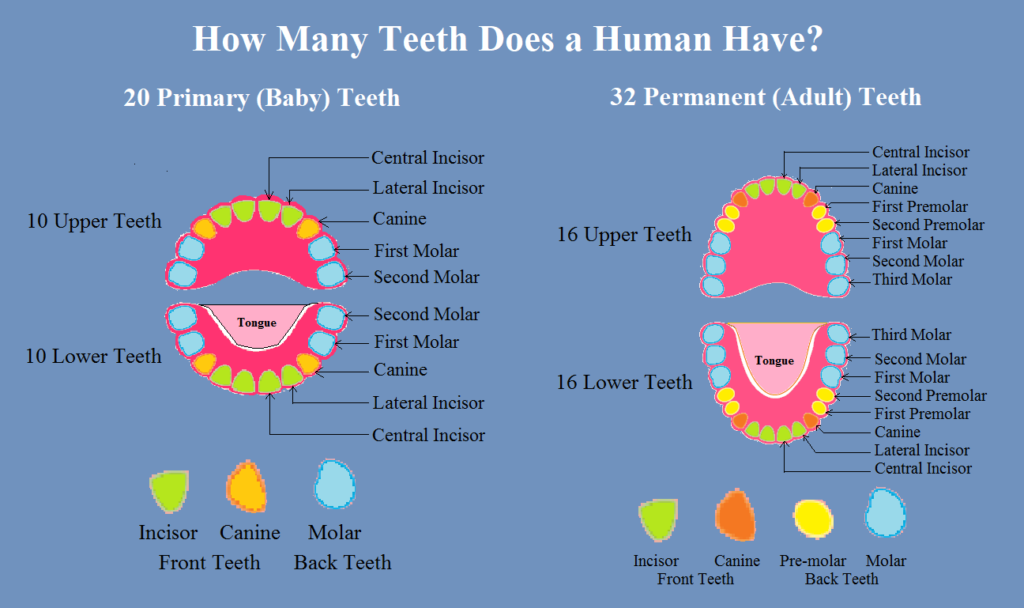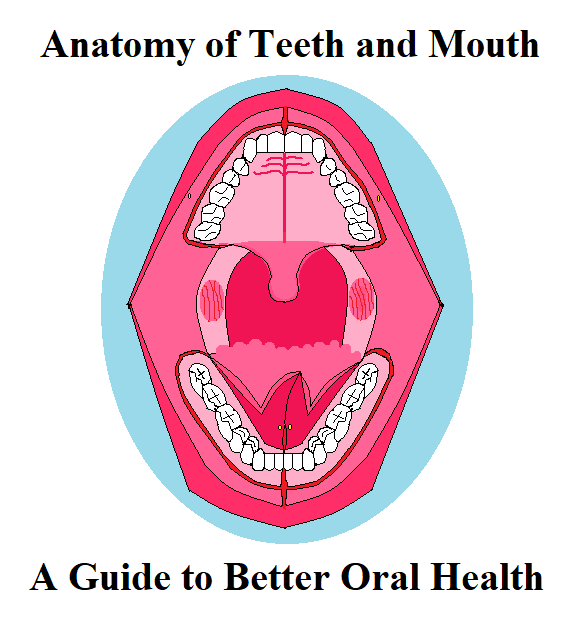
How many teeth does a Human have? : Humans have 20 primary teeth and 32 permanent teeth
Introduction
When it comes to our oral anatomy, the question of “How many teeth does a human have and why?” might not be something we think about on a daily basis. However, this fundamental aspect of our oral health plays a significant role in various aspects of our lives, from chewing and speaking to overall facial aesthetics. So, if you’ve ever wondered about the query, “How many teeth does a human have and why?”—you’re not alone.
In this article, we’ll delve into this intriguing question and provide you with insights into the typical number of teeth and their names in a human mouth. Humans get two full sets of teeth over their lifetime: 1. As a baby, you should have 20 primary teeth, and 2. As an adult, you have 32 permanent teeth. However, the number of teeth a human being should have depends on their age and overall health. This exploration will shed light on the fascinating world of human dentition.
How many teeth should a child have?
By the age of 3 years, the average child should have 20 baby teeth. 10 teeth in upper jaw and 10 teeth in lower jaw. Baby teeth are also known as milk teeth, primary teeth, or deciduous teeth. Primary teeth are the first set of teeth develop in a child’s mouth. The first primary teeth, start to erupt (come-in) when child is between 6 and 9 months old. For most children, all 20 primary teeth erupt by the age of 3 years. Primary teeth are temporary teeth, eventually fall out (exfoliate) and replaced by permanent teeth as the child grows. Between the ages of about 6 and 7 years, the primary teeth start to shed and the permanent teeth begin to erupt. The last baby teeth usually lost around the age of 12 years. By the age of 12 to 13 years, most children have lost all of their primary teeth and have 28 of their permanent teeth. The remaining 4 permanent teeth, the wisdom teeth, usually erupt between the ages of 17 and 21 years.
Why do we need Baby Teeth?
Primary teeth help child to chew and speak, that make the jaws grow to accommodate larger and stronger permanent teeth. They hold space (space-keepers) for permanent teeth growing in the jaws. Even though baby teeth are temporary, it’s very important to keep them clean to maintain lifelong oral health, because tooth decay in childhood can adversely affect adult teeth. Furthermore, primary teeth play an important role in the overall growth and development of child.
Types of Primary teeth and their numbers:
- Incisors: Total 8 incisors located in the front of the mouth, 4 in upper jaw and 4 in lower jaw.
- Canines: Total 4 canines located at corner of the mouth next to incisors, 2 in upper jaw and 2 in lower jaw.
- Molars: Total 8 molars located in the back of the mouth, 4 in upper jaw and 4 in lower jaw.
How many teeth should an adult have?
By the age of 21 years, the average person has 32 permanent teeth, including 4 wisdom teeth. Wisdom teeth also known as third or last molars, typically erupt (comes-in) between the ages of 17 and 21 years. In some cases, wisdom teeth may not erupt at all or may become blocked and require removal. However, studies showed that the human jaws began shrinking around the time humans transitioned from hunter-gatherers to farmers. This is because of cooked softer and easier to chew food. In modern times, we are eating more soft and refined food, which didn’t require a big jaw. That’s why, not everyone can fit all 32 adult teeth in their jaws. The average mouth of present generation is made to hold only 28 permanent teeth and missing or blocked all 4 wisdom teeth.
A little variation in the eruption of either primary or permanent teeth is considered normal, and that can be due to variety of factors such as genetics, nutrition, health status and environmental factors.
Types of Permanent teeth and their numbers:
Out of total 32 permanent teeth, 16 teeth are present in the upper jaw and 16 in the lower jaw. Among these teeth are 8 incisors, 4 canines, 8 premolars and 12 molars (including 4 wisdom teeth).
- Incisors: Total 8 incisors located in the front of the mouth, 4 in upper jaw and 4 in lower jaw.
- Canines: Total 4 canines located at corner of the mouth next to incisors, 2 in upper and 2 in lower jaw.
- Premolars: Total 8 pre-molars, 4 in upper and 4 in lower jaw, located between the molars and the front teeth (incisors and canines).
- Molars: Total 12 molars, including 4 wisdom teeth or last molars. Molars are located in the back of the mouth, 6 in the upper and 6 in the lower jaw.
Why do humans have a set number of teeth?
- Human beings have a predetermined number of teeth because it is a result of evolutionary adaptation to our dietary needs and oral health.
- Over time, our ancestors developed a specific number of teeth that were most effective for the types of food they consumed.
- This set number of teeth allows for efficient chewing, speaking, and maintaining oral health.
- Having a consistent number of teeth also ensures stability in our oral structure, supporting facial aesthetics and overall function.
Conclusion
Humans get two full sets of teeth over the lifetime, 20 primary teeth in childhood and 28 to 32 permanent teeth in adulthood. However, some people have fewer or more teeth due to various reasons, such as genetics, dental problems, or injury. Proper oral hygiene and regular dental check-ups can help maintain healthy teeth and ensure they last a lifetime.
FAQs
Q1: How many teeth does an average adult human have?
A1: An average adult human typically has 32 teeth, including 8 incisors, 4 canines, 8 premolars, and 12 molars (including 4 wisdom teeth).
Q2: Do children have the same number of teeth as adults?
A2: No, children start with a primary set of teeth, commonly known as baby teeth or deciduous teeth. Children usually have 20 primary teeth, which are eventually replaced by their permanent adult teeth.
Q3: What are wisdom teeth?
A3: Wisdom teeth, also called third molars, are the last set of molars that often emerge in late adolescence or early adulthood. Some individuals may have them removed due to issues like overcrowding or improper alignment.
Q4: Can the number of teeth vary among individuals?
A4: Yes, some individuals might have fewer teeth due to congenital conditions or dental procedures. Conversely, some individuals might retain additional teeth, a condition known as supernumerary teeth.
Q5: How does tooth loss affect the number of teeth?
A5: Tooth loss due to factors like decay, trauma, or gum disease can reduce the total number of teeth in an individual’s mouth. Dental prosthetics like dentures, implants, or bridges can be used to restore missing teeth.
Q6: What is the importance of maintaining the right number of teeth?
A6: Having the appropriate number of teeth is essential for proper chewing, speaking, and maintaining facial structure. An incorrect number of teeth can lead to oral health problems and affect overall well-being.
Q7: Do all cultures and regions have the same number of teeth?
A7: Yes, the number of teeth in humans is consistent across different cultures and regions. However, dental care practices and access to healthcare can influence the condition of teeth.
Q8: Are there any evolutionary reasons for the number of teeth in humans?
A8: The number of teeth in humans is believed to be a result of evolution and dietary changes over time. As human diets evolved, the need for certain types of teeth changed, leading to the current dental pattern.
Q9: How can I maintain good oral health and preserve my teeth?
A9: Maintaining good oral hygiene practices, such as regular brushing, flossing, and visiting the dentist, is crucial for preserving your teeth and overall oral health.
Q10: What happens if wisdom teeth are not removed?
A10: Wisdom teeth that are impacted or causing issues like pain, infection, or misalignment may need to be removed. Failure to address such issues can lead to oral health complications.
Please note that the number of teeth can vary due to individual circumstances, dental anomalies, or medical conditions. It’s always best to consult a dentist for personalized information and advice.


